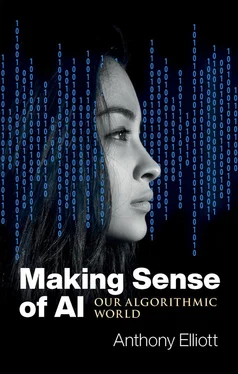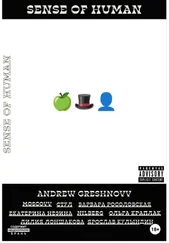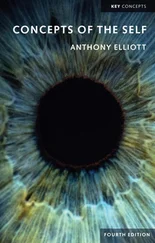If for Stiegler Google Translate represents destructive linguistic entropy, the algorithmic automation of society signals massive economic entropy. AI makes it possible not just to economize upon labour, but to fully automate tasks and thus render employees redundant. This is a redundancy of the worker’s expertise, as advanced automation for Stiegler produces a generalized (economic as well as environmental) ‘disorder of hyper-standardization’ – where work, and the value of employees, are determined by calculating probabilities based upon averages. Today’s industrial capitalism, writes Stiegler, is ‘an era in which calculation prevails over every other criteria of decision-making , and where algorithmic and mechanical becoming is concretized and materialized as logical automation and automatism . . . as computational society becomes a society that is automated and remotely controlled’. 14We are at the beginning of a process of technological transformation that will have a massive impact upon the nature of work, expertise and knowledge – the algorithmic governmentality of 24/7 capitalism, according to Stiegler, will precipitate ‘entropic catastrophe’.
The new technological landscape, however, results not only in doom and gloom. Stiegler also seeks to discern a hidden trend in economic entropy for reversing the devastating impacts of algorithmic capitalism. Emancipation for Stiegler is linked to the primacy of meaningful work, which he sharply differentiates from employment. In this perspective, work is fundamentally meaningful and creative, whereas the bureaucratized terrain of employment is increasingly automated and dependent upon computational software. His argument, broadly speaking, is that the production and transformation of automation prepare the way, paradoxically, for the ‘dis-automatization of society’. In a striking irony, the kind of employment which is bound up with automated entropy also consists in de-automating routines, which can liberate most of the population from exploitative domination. If employment is increasingly the terrain of advanced automation, complex algorithms and computational software on the one hand, work produces value and the creation of something new to society on the other hand. From this angle, Stiegler emphasizes that work consists of practical know-how ( savoir-faire ), formal knowledge ( savoirs formels ) and life skills ( savoir-vivre ). The ‘data economy’ is therefore not the inevitable destiny of automated society; a range of other possible systems can be envisaged. This scenario, Stiegler proposes, is already practicable. We have reached a stage, in algorithmic capitalism, in which the automated forces of production are overdeveloped and new economic models based on the social economy and cultural solidarity – especially through associations, cooperatives and public services, as well as new industries – will create novel, intermittent forms of work and new professions. A non-repressive automated society, Stiegler argues, would become an ‘economy of contribution’.
How is it possible that there should be such significant differences in assessment between two authors associated with the transformationalist position? To begin with, Stiegler’s writings serve as an apt counterbalance to Schwab’s emphases, particularly the former’s penetrating analysis of the very large decline in jobs worldwide resulting from advanced automation. Schwab’s work is explicitly concentrated on how organizations create value, and he repeatedly emphasizes that technological transformation today creates new opportunities and dilemmas – the results of which can lead to positive, shared benefits for all of society. Stiegler on the other hand clearly does intend his analysis to have a very broad application: not just economics and the market, but society and the politics of life itself. Whilst some have dismissed Stiegler’s work as excessively influenced by the jargon of radical French theory, his critique of the production of automation in contemporary social life, as AI displaces labour, remains highly significant. In demonstrating that advanced automation produces an entropic violence of hyper-standardization, Stiegler’s critique arguably confronts head-on the most painfully destructive and debilitating aspects of algorithmic capitalism. We can also see that fundamental lines of difference are to be found among voices advocating the transformationalist position. This is an important point. Contrasting the contributions of Schwab and Stiegler highlights that the transformationalist position is not cut of one cloth.
Box 2.2 Transformationalists
1 Rejecting the claim of business-as-usual for the global economy, transformationalists see AI as an expression of broader digital shifts occurring in institutional life and contemporary society. Industry 4.0, big data and supercomputers are key examples.
2 There is an emphasis upon a revolutionary transformation of manufacturing and services, which demands a radical rethinking of labour market strategies.
3 Transformationalists are concerned not just with intensified economic dynamism stemming from AI, but with changes in society, culture and political life. In other words, AI transforms not only how we work but also how we live.
4 Some assessments emphasize that AI promotes productivity and economic growth, which in turn fosters innovation. Other assessments position economic growth and social equality as out of alignment, with resulting predictions of jobless futures.
5 Public policy requires far-reaching adjustments and shifts as a result of the AI revolution.
6 AI is global and transnational in scope, and its resulting opportunities and risks impact nations around the world. As such, AI requires creative responses from policy-makers and politicians about forms of effective political regulation, democratic accountability and ethical governance.
The Perspectives Compared
If this is true for grasping internal differences within the transformationalist standpoint, it is equally so for understanding the general debate between sceptics and transformationalists. Representing current lines of division in this debate between those that argue AI produces a world of massive and unending change – the transformationalists – and those who consider technological shifts as simply business as usual for the economy – the sceptics – is overly simplistic. Reductive as it may be, however, this is not to say that such exaggerated characterizations of the sceptics and their critics fail to influence broader public arguments about, and social policy shaping, AI and its consequences. Although the debate between sceptics and transformationalists cannot be said to have been particularly illuminating – the participants in these exchanges too often talk past one another – it does highlight that these broad standpoints shape many diverse arguments and opinions about AI, advanced robotics and accelerating automation. There are many different positions and interpretations of sceptical and transformationalist views of AI – with overlapping areas of consensus as well as contention – and these are vital for making sense of the consequences of AI.
The development of a comprehensive and systematic understanding of the consequences of AI has to tread a difficult path between transformationalism and scepticism. We need to recognize that the AI revolution is already well under way, and that this is resulting in new opportunities and new burdens in equal measure. So far, the evidence indicates that – because of AI technologies and advanced automation – the proportion of workers in manufacturing will continue to decline sharply in all the industrialized countries. Whilst automated production destroys jobs within the factory, however, it may create many other jobs elsewhere in the economy. Nobel laureate economist Christopher Pissarides, for example, argues that rapidly increasing automation ‘implies faster economic growth, more consumer spending, increased labour demand, and thus greater job creation’. 15The same mix of opportunity and risk pervades other areas of economy and society impacted by AI too. It is not viable to assess such developments from either sceptical or transformationalist positions alone. What ties these socio-technological changes together is a new landscape of opportunity and risk, and the AI revolution lies at the core of them.
Читать дальше

![Джейн Остин - Sense and Sensibility [С англо-русским словарем]](/books/26612/dzhejn-ostin-sense-and-sensibility-s-anglo-thumb.webp)










